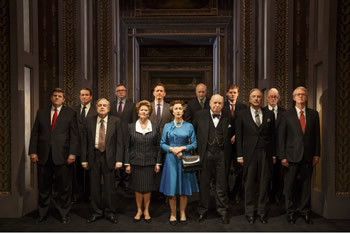
She'll Go On
By Jonathan Kalb
The Audience
By Peter Morgan
Gerald Schoenfeld Theatre
245 W. 45th St.
TICKETS
One hazard of a role like Queen Elizabeth II in The Audience is that some ungenerous people may feel that the actress isn’t really doing much. Come to think of it, that goes for the queen she’s portraying too, a figurehead without political power whose expensive maintenance is often publicly questioned. The impersonation of famous figures always provides a bit of a thrill to audiences, and Helen Mirren, who won an Oscar for portraying this same monarch in The Queen, is a major celebrity in her own right. That sort of rush fades quickly, though. It’s a good thing Mirren really is doing a lot of subtle acting in Peter Morgan’s play. In fact, if you look closely, her acting is extraordinary, an awesome spectacle of judicious restraint, perseverance and indefatigability. Like Elizabeth herself, actually.
The Audience, as you may have heard, consists of a string of visits to the queen by 8 of the 12 prime ministers who have served under her during her 63-year reign. She is established as the steady rock enduring wave upon wave of changes in politics, social conditions, fashions and mores, represented by the various characters of the PMs from Churchill to Cameron. Mirren subtly alters her manner and bearing as appropriate to her changing age from scene to scene, all the while conveying that Elizabeth, on a deeper level, remains reassuringly the same. Her occasional interactions with her childhood self (played alternately by Sadie Sink and Elizabeth Teeter) reinforce this impression of character-permanence.
Morgan has been rightly faulted for the sketchiness of his PM portraits. Some are little more than straw men or foils for Mirren’s sparkle. Yet the sum is greater than the flimsy parts because of the acuity of Mirren’s performance. The mastery is in her hundreds of small choices. Watch the series of changes to her posture over the course of the evening, for instance, her efforts to maintain poise and equanimity in an aging body. And watch the flickering movements of her mouth, signaling mood to herself alone, as she bids each PM goodbye. Mirren makes the limitations of the queen’s role seem like a public trial in which only someone of superior integrity can triumph. Privileged as her character is, one leaves feeling that hers is a decidedly brave and difficult approach to life.
Bizarre as it may sound, it occurred to me watching Mirren that her Elizabeth shares certain qualities with Winnie in Happy Days—Samuel Beckett’s famously indefatigable character whose predicament is that she is buried and sinking in a mound of earth. Mirren’s queen might be a sort of aristocratic Winnie, metaphorically trapped in the gilded “mound” of Buckingham Palace where she entertains a succession of political Willies who appear as various Prime Ministers. These men (and one mannish woman) never say much of substance, one feels, because she has the long view and the penetrating lines to make us want to understand it. The PMs are smart, but she’s the character who knows what time means.
I wouldn’t press this comparison too far. I would add, though, that the PMs, like Beckett’s Willie, all possess a kind of gun—political power—which they could wield at any moment to eliminate or subdue the inconvenient monarch (albeit at great cost to themselves). None of them ever do use it because . . . well, because they don’t want to. Deep down, they love what the queen represents. And that political stalemate is more moving with a whiff of existential awareness that only an actor of Mirren’s caliber can muster.
